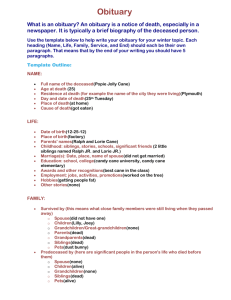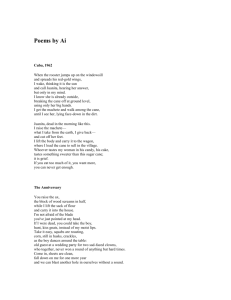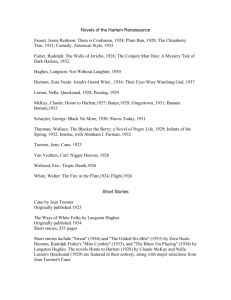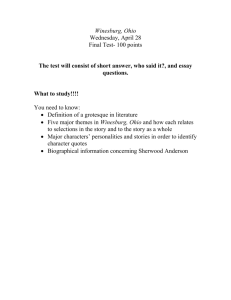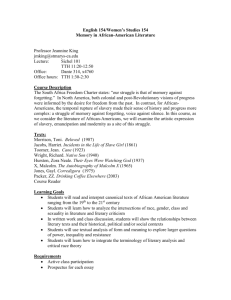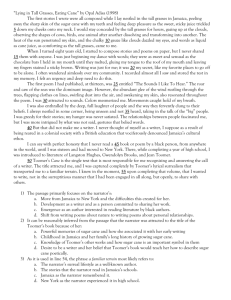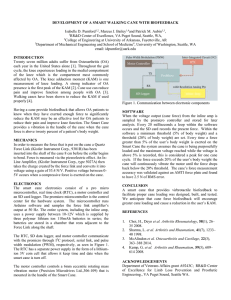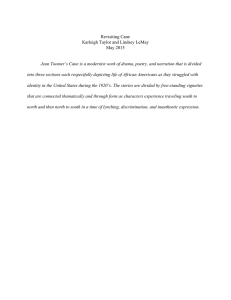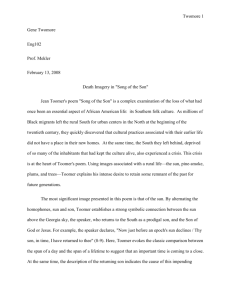Sophisticated Life: The Modern Experience in Jean Toomer's Cane
advertisement
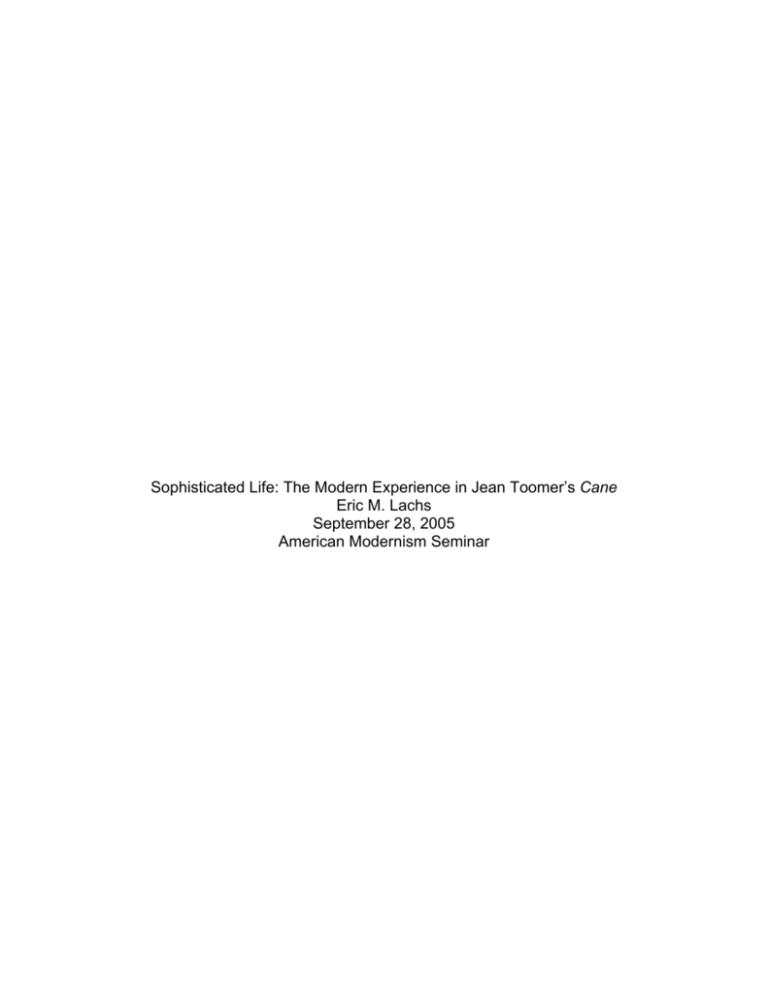
Sophisticated Life: The Modern Experience in Jean Toomer’s Cane Eric M. Lachs September 28, 2005 American Modernism Seminar 2 Jean Toomer’s Cane elucidates the complicated racial plight of early twentieth century America. His assumably conscientious attempt to consider a social panacea is belied only by the appearance that the entire work fails to provide any direct solution to the modern experience. There exists, however, a referential significance that realigns his project with messages of Sherwood Anderson’s Winesburg, Ohio, an earlier work from the modernist canon. A close reading of Cane’s structure and thematic content suggests that the importance of sophistication and companionship found in Winesburg, Ohio epitomize the aspirations of modern maturity that Toomer recognized. Though Cane’s diverse characters aspire to find love and the sophisticated, complex truth of life, it is the misunderstanding of these ideas that connects the stories. In what may be the most obvious formulaic consistency in the collection of chronicles, each tale, almost by necessity, concludes with an anti-climax. These occurrences abruptly disrupt the expected narrative trend, as in the case of each of the six women in the first demarcation of the book. Karintha endlessly involves herself in relationships that deny her anything meaningful, Becky dies accidentally without forming any worldly existence or belonging, Carma is unfaithful and is never made to acknowledge the consequences, Fern inspires intangible desire in all men 3 and denies it an outlet, Esther conjures a great love for years that dissolves in seconds, and Louisa neglects to decide what man can claim her. Similarly, Winesburg, Ohio avoids the culmination of any great conclusive narrative energy in almost every section. “Sophistication,” the last chapter before the main character leaves town, follows this style remarkably. By extension, it also provides the ideal model of a concise catharsis without engaging major change. George Willard pines longingly about town to express his feeling of maturity and love to Helen, a girl that has weighed on his mind, and ends up sitting with her in silence as the night passes. Avey’s story in Cane is so similar to this that if it isn’t a precise reference then it must be an unconscious allusion. The narrator loves Avey and expresses a persistency that rivals the other boys. Both stories include an educated suitor that the woman dismisses in favor of the main character who attempts to express maturity, intimating that sophisticated companionship trumps the bore of studiousness. Both men lose their women to big city life and college, insofar as Cane’s narrator ventures to New York, never finds Avey, and is barely able to sustain himself, which displays a pejorative sense of modern urbanity. Finally, both stories end with a stifling silence when the boys are alone in a park with the girls they have spent months waiting for. 4 The precise hopefulness and understanding that George Willard exhibits in “Sophistication” separates his story from the frustration in “Avey” and Cane at large. George reflects on the silliness of his previous declaration of maturity and understands the simplicity of sophistication as realizing the glaring insignificance of normal life. His experience confirms this after satisfying his desire to kiss Helen. In some way chastened and purified by the mood they had been in they became, not man and woman, not boy and girl, but excited little animals…. For some reason they could not have explained that they had both got from their silent evening together the thing needed. Man or boy, woman or girl, they had for a moment taken hold of the thing that makes the mature life of men and women in the modern world possible. (Anderson 136) After embracing, the pair is embarrassed about the influence that their desires had, and they cherish the gentle moment, something which Cane’s characters never accomplish in “Theater,” “Bona and Paul,” or “Kabnis.” In the conglomeration of potential in Cane’s women, almost every hope is dissolved. Karintha is only able to relate with men on a physical level, while they reduce her existence to a quantified commodity despite her great beauty. Becky accepts her banishment and is sustained only by the whim of others, a situation that creates murderers out of her sons. Carma wastes her marriage and her husband is condemned. Fern remains chaste and she is protected 5 rather than cherished. Esther falls in love with a fleeting idea and faces destruction and humiliation because of it. Louisa refuses to choose one love in favor of losing them both to horrible circumstances. These two books consider the same sophistication and love in similar stories, however Cane’s hopelessness differentiates it. George Willard leaves Winesburg with sophistication and a renewed aspiration towards a big city’s newspaper. With a similar aim, a short poem in Cane narrates a bee’s desire to pollinate the most distant flower. The final section provides Kabnis and Lewis as fragmented halves of the main character. Kabnis is perpetually afraid, but he possesses the wherewithal of feeling and emotion, whereas Lewis is incapable of primal action because of his intelligence and strength. They both change directions: Lewis, obviously schooled in the North, comes to the South to find some purpose and Kabnis retreats from the assimilated Hanby and accepts a blacksmith job at Halsey’s shop. Lewis’s purpose is curtailed by a threat from his own community. The story ends with Kabnis returning to a new job after a night of indiscretion, much in the same circumstance as George Willard, without realizing that he is returning to a dead profession on the eve of the automobile boom and Taylorist production models. 6 Toomer’s story recalls the biblical character Cain, which brings a masculine and racially-charged tone to the story. Coincidentally or not, Winesburg, Ohio has a story about Enoch Robinson, a lonely artist who begins talking to himself when he finds nobody worthwhile. Enoch, the biblical son of Cain, would appeal to Toomer’s conception of a creative identity lost in modern times. In accordance with the concept of the grotesque, the disturbance of an overbearing dedication, Enoch sacrifices his established family and friends, and by doing so he rejects the sophisticated outlook and is consumed by the petty insignificance of critique. Toomer permits the burdens of minutiae and inconsequential desires to control his characters, with George Willard’s realization in the periphery. Cane adapts the concept of a grotesque to unite its characters. It explores the negligible differences between certain characters in order to get at the overwhelming similarities. “Sophistication” and companionship burden the modern experience only inasmuch as they are overestimated and become a preoccupation of desire. 7 Works Cited Anderson, Sherwood. Winesburg, Ohio. New York, NY: W. W. Norton & Company, 1996. Toomer, Jean. Cane. New York, NY: W. W. Norton & Company, 1988.
